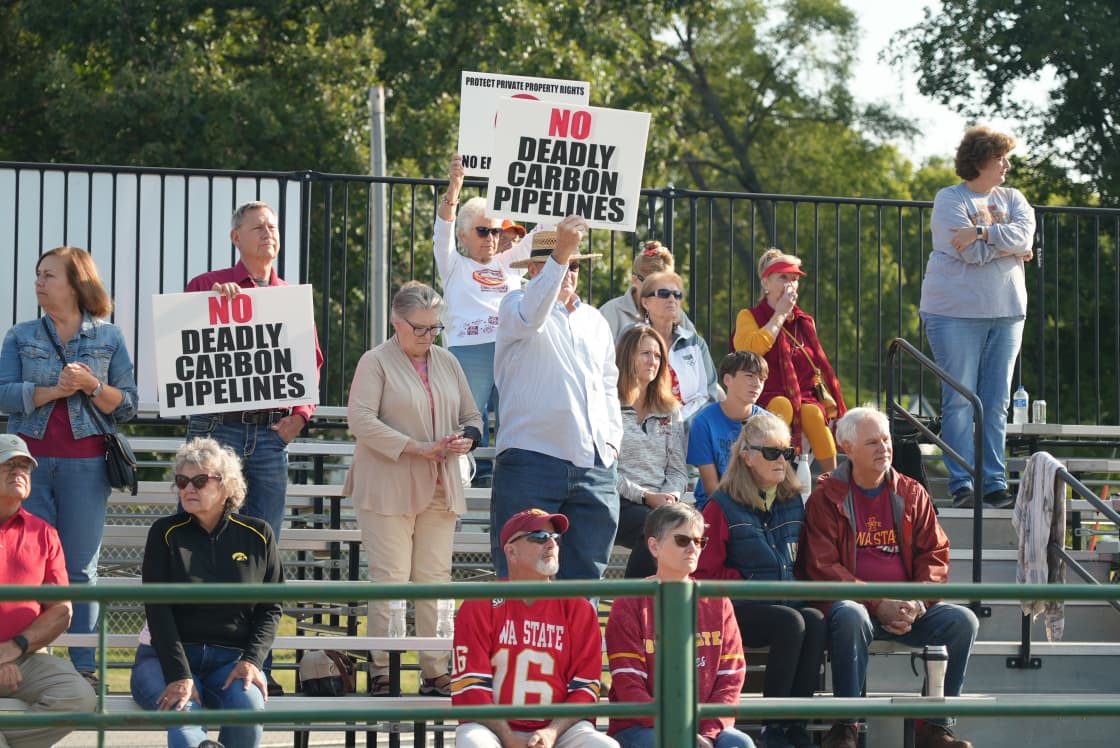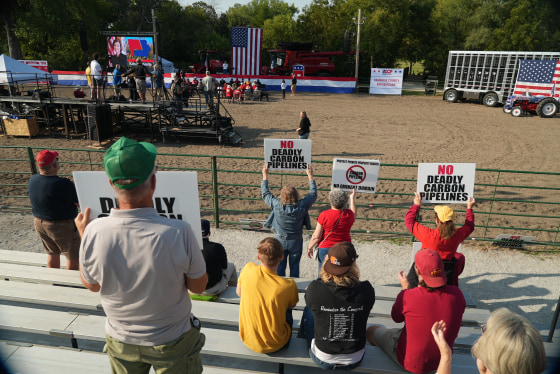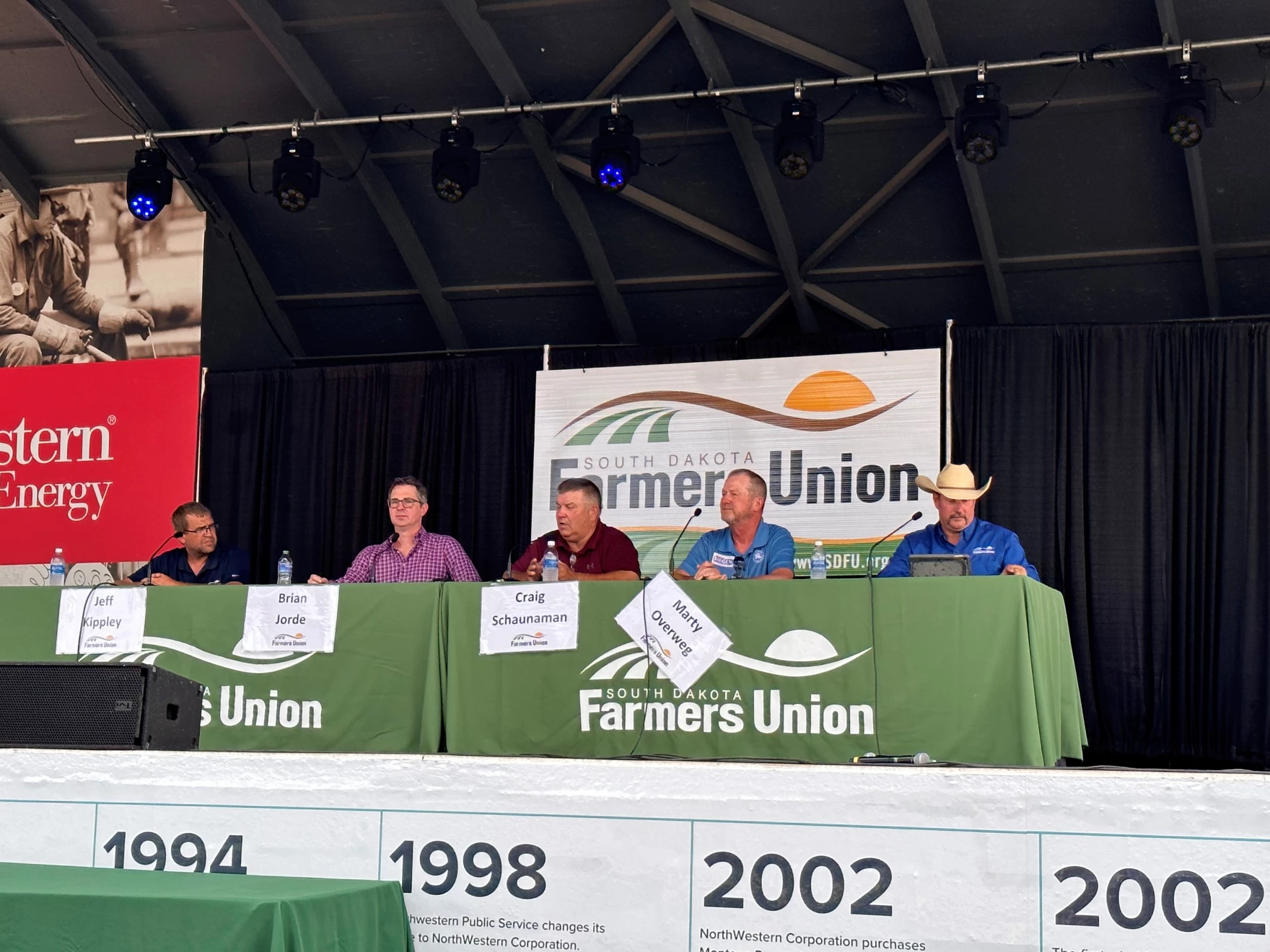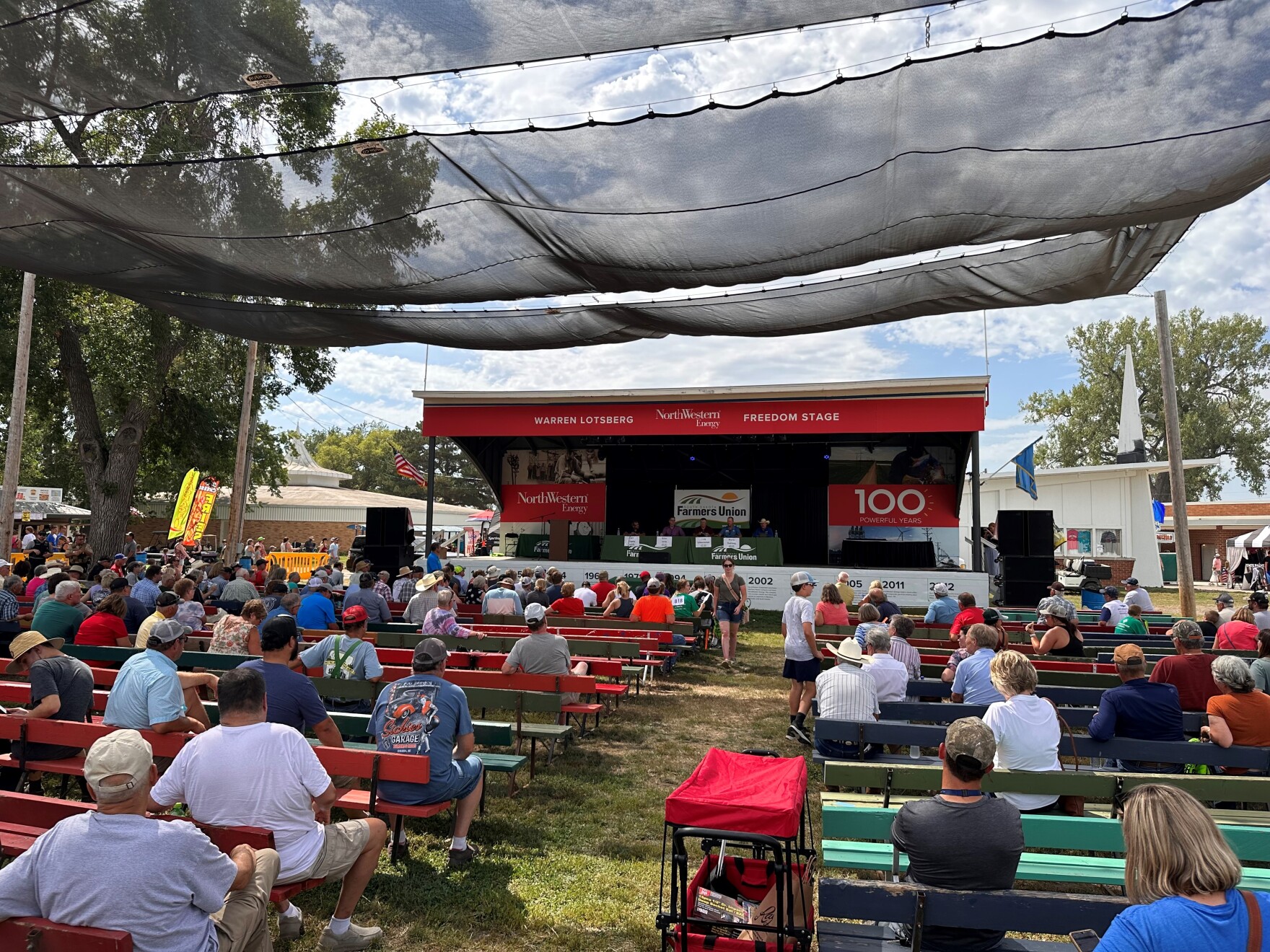
by Jordan Mason | Sep 22, 2023 | Archived
North Dakota state’s utility regulator has granted reconsideration for a carbon dioxide (CO2) pipeline project by Summit Carbon Solutions earlier rejected for concerns including safety.
The North Dakota Public Service Commission (NDPSC) had rejected the permit application for the Midwest Carbon Express project due to “broad concerns” relayed to the regulator during public consultations, the agency said in a decision released August 4. The concerns span “eminent domain, safety, the policy of permanent CO2 sequestration and storage, setback distances, irreparable harm to underground drain tile systems, impacts on property values, and the ability to obtain liability insurance due to the project”, the regulator’s rejection announcement said.
Summit had proposed for the pipeline to cross through the counties of Burleigh, Cass, Dickey, Emmons, Logan, McIntosh, Morton, Oliver, Richland and Sargent, according to the commission statement August 4. As part of its petition for reconsideration, Summit now said it would implement a reroute around the state capital, Bismarck.
Summit had said the project would serve 12 ethanol plants in the company’s home state of Iowa. While the $4.5 billion project would be based in Iowa, it targets permanent storage of CO2 underground in North Dakota, according to a Summit news release March 11, 2022. “In all, Summit plans to have 681 miles of pipeline routed through Iowa, running through 30 Iowa counties” while the entire length “measures just under 2,000 miles”, that announcement said.
Announcing the rejection of the permit application in August, the North Dakota regulator said, “Landowners and intervenors testified that the project would cause adverse effects on the value of their property and residential development projects… Landowners repeatedly testified that they had contacted Summit with requests for reroutes across their properties or other mitigation steps but heard nothing back from the company”.
The regulator also noted issues relating to eminent domain and safety but said that it had no jurisdiction over these aspects, which are overseen by the Pipeline and Hazardous Materials Safety Administration of the Transportation Department.
Summit had also failed to address concerns by the North Dakota State Historical Preservation Office (SHPO), whose “concurrence is commonly required by the Commission for issuance of a siting permit”, the NDPSC added.
Furthermore, “The U.S. Geological Survey noted 14 areas of potential geological instability within the project corridor”, it continued. “Summit has not submitted information to the Commission demonstrating how it has addressed these concerns”.
In a press release announcing the granting of the reconsideration, Summit said, “Subsequently, we rerouted around Bismarck, made adjustments to drill or bypass game management and geo-hazard areas, and collaborated with the State Historic Preservation Office to record the findings of cultural surveys”.
“Summit Carbon Solutions remains deeply committed to supporting North Dakota’s energy industry, and working with farmers, ranchers, and the broader community”, the company added. “To date, Summit Carbon Solutions has partnered with more than 76 percent of landowners along the route in North Dakota, and has acquired nearly 90 percent of the pore space for sequestration”.
In its own announcement about the granting of the reconsideration, the NDPSC said, “In its petition, Summit has requested an opportunity to present relevant evidence at a hearing or hearings to demonstrate on the record that it has addressed, or will address, the deficiencies noted in the PSC’s Aug. 4, 2023, order to deny the permit”.
“Today’s decision took that into account as a decision to deny the reconsideration would have forced the company to reapply and start the permitting process all over, including throwing out all information currently in the record”, the regulator added. “That record includes information gathered at five different public hearings held across the state, which included lengthy and valuable testimony from the company, intervenors and the public.
“The Commission will determine at a future date any details regarding a hearing or hearings and what issues will be considered during that process”.
To contact the author, email jov.onsat@rigzone.com

by Jordan Mason | Sep 22, 2023 | Archived
(The Center Square) – Summit Carbon Solutions’ plan for a carbon dioxide pipeline through the Midwest has new life in North Dakota as hearings in Iowa resume this week.
The North Dakota Public Service Commission is allowing the company to present additional evidence after denying a pipeline permit in early August by outlining concerns in the regulator’s denial. Summit will not have to reapply, which would save time, according to the commission.
“We’ve listened to and learned from the concerns raised by the North Dakota Public Service Commission,” said Summit Carbon Solutions CEO Lee Blank in a news release issued after Friday’s decision. “Subsequently, we rerouted around Bismarck, made adjustments to drill or bypass game management and geo-hazard areas, and collaborated with the State Historic Preservation Office to record the findings of cultural surveys.”
The South Dakota Public Utilities Commission denied Summit’s permit last week, but the commission said the company could reapply.
The Iowa Utilities Board is continuing a hearing this week on the 720 miles of the pipeline that runs through that state. The other states on the 2,000-mile, $5.5 billion carbon dioxide pipeline are Minnesota, Nebraska, North Dakota and South Dakota.
Some residents in the path of the pipeline said they are concerned about safety and the use of public money to fund private projects.
“Our communities are not prepared to deal with the necessary emergency response measures needed in case of a pipeline rupture,” said Dunlap, Iowa resident Ken Dunham in written testimony in written testimony to the Iowa PUB. “Billions of our tax dollars should not be used to enrich CEOs for the sake of a false climate solution or the insignificant, temporary jobs the projects would demand.”
But there is also support for the pipeline, Summit attorney Brett Koenecke told South Dakota regulators.
“We’ve got easements from 72-73% of the landowners which the route crosses and so I do want to point out the broad support that this project enjoys. I don’t want to deny that there is opposition, but there is broad support,” said Koenecke.

by Jordan Mason | Sep 22, 2023 | Archived
OSKALOOSA — The Mahaska County Board of Supervisors discussed options available to county landowners who are set to be impacted by the proposed Navigator Pipeline, a carbon capture and sequester pipeline that, if approved, would run through Mahaska County.
The board was joined at their regular Monday morning meeting by Tiffany Kruizenga, an inspector with ISG. Kruizenga is part of a team hired by the county but ultimately funded by the pipeline company in accordance with Iowa Code to ensure landowners have all available resources at their disposal when writing easements and dealing with land agents concerning access for the proposed pipeline.
The proposed Navigator Pipeline is a carbon capture and sequester pipeline spearheaded by Navigator CO2 Ventures. If approved, the pipeline would run through 36 Iowa counties including Mahaska and Wapello. The line is still in the permitting stage and recently was rejected for a permit in South Dakota. Efforts remain underway to gain approval for land access, causing some Iowa landowners to fear for their land rights.
Kruizenga says she is at the disposal of Mahaska County residents to provide guidance as they advocate for their own wants and needs during the permitting process.
“Our role, set by the Iowa Utilities Board, is to help ensure that the Chapter Nine enforcing regulations are adhered to throughout the construction process,” Kruizenga says. “As a goodwill gesture, as Mahaska County or any county that signed on with us prior to construction starting, we become a resource for the landowners to help understand what the code includes. As you’re working with the land agents with the pipeline, if you have questions and aren’t sure if your needs or wants are in the code, we can help provide that.”
Kruizenga and her team can provide information and help with answering questions about fencing, tree removal, soil compaction and more in connection with the pipeline, ensuring that all phases of the construction process are executed in accordance with Iowa Code.
Kruizenga says that if Mahaska County residents have questions or concerns, they can get in touch by contacting ISG’s Des Moines office and asking to be transferred to her. The phone number for ISG’s Des Moines office is 515-243-9143.
State Rep. Helena Hayes (R) was also present at the meeting and announced that she will be holding an informational meeting about the pipeline at the Fremont Community Center this coming Wednesday, Sept. 20, at 6 p.m. The meeting will include a history of the pipeline issue, a talk with Anna Ryan, formerly of the Office of Consumer Advocacy, and emergency management personnel from Satartia, Mississippi, a community that experienced a poisonous carbon pipeline rupture in February 2020.
Supervisors discuss putting regional airport to a county-wide vote
The board of supervisors also discussed the proposed South Central Regional Airport, ultimately deciding that the supervisors do not have the authority to put the issue to a county-wide vote.
“In the code there are certain times when you can have a public measure of the ballot,” says County Attorney Andrew Ritland. “Public measure can include the authorization of exceeding a levy, it could be creation of a special district of some kind, like a water district or fire district. There’s a lot of different ways that public measures can get on the ballot. However, there must be specific authorization in the code to put a public measure on. It has to be for a committed purpose.”
Ritland addressed the previous vote on the issue, which was taken in 2005.
“As we recall,” he says, “There was a vote in the City of Oskaloosa … a little while ago. In that vote, it was based on section Iowa Code 330.17, which says if you’re going to transfer the control of an airport from, for example, a city into an airport authority, that needs to be approved by the voters. So if you’re going to create a semi-independent body to operate an airport that used to be held by a city or a county, the voters need to approve that transfer. Obviously the voters of Osklaoosa did not approve the transfer. But there is no general authority to put a question on the ballot regarding a question of public policy.”
Ritland added that some cities in Iowa, called “charter cities,” operate under a city charter that can include the right to Initiative and Referendum, which allows citizens to present initiatives to the city council and put policy issues directly before the voters. Oskaloosa is currently one of these cities. However, in May of this year, the Oskaloosa City Council controversially voted to remove the article providing for Initiative and Referendum from its city charter.
“There is no equivalent in county government of Initiative and Referendum,” Ritland says. “It’s a creature of a charter city, and I would note that it’s somewhat in flux in Oskaloosa because the City Council is trying to remove that ability for citizen initiative.”
A petition has been filed to put the council’s vote to remove Initiative and Referendum from the city charter to a vote this November.
Ritland says that there is no point to the county holding its own vote on the airport, given that the result of the vote would have no binding legal effect. Ritland says that he has been in contact with the Deputy Secretary of State who is in charge of elections state-wide, and that he was advised that in the absence of any “statutory authorization,” the issue cannot be added to the ballot.
“Typically on a ballot, when the voters say ‘I want this to happen’ and there’s a majority approval, there’s a legal obligation that that must happen, right. But in this case, it just doesn’t really do anything. There’s no legal effect,” Ritland says.

by Jordan Mason | Sep 22, 2023 | Archived
NEVADA, Iowa — North Dakota Gov. Doug Burgum, a GOP presidential candidate, had a tense exchange with crowd members at an event Saturday over the use of eminent domain to install carbon capture pipelines.
At the Fourth Congressional district’s presidential rally in Nevada, Iowa, a man accused Burgum of being a “huge supporter” of eminent domain, which allows the government to seize private land for public projects, for the installation of carbon-capture pipelines.
“What’s going on with the pipeline is you’re taking private property rights away from our landowners that don’t want this,” the man said. “But eminent domain is meant to take private property for public use. There is no public value in here.”
Three companies — Summit Carbon Solutions, Navigator CO2 Ventures, and Wolf Carbon Solutions — have proposed underground pipelines to move CO2 emitted from ethanol and other industrial plants from Iowa to either North Dakota or Illinois.
“The Wolf development team has never used eminent domain in its collective careers in building long-haul pipelines and it doesn’t intend to start now,” Nick Noppinger, Wolf Carbon Solutions’ vice president for corporate development, told The Gazette newspaper in February.
Hearings are ongoing in Iowa to weigh approval for Summit’s permit. Sabrina Zenor, the company’s marketing and communications director, said by text Saturday night that it understands concerns about eminent domain and aims for voluntary easements.
Navigator, which had its construction permit denied in South Dakota, was seeking permission to use eminent domain in Iowa, The Gazette reported in March.

Crowd members hold up signs against the use of eminent domain to install CO2 pipelines on private land at a political rally Saturday in Nevada, Iowa.Alex Tabet / NBC News
Voters across Iowa and some in attendance at the event Saturday expressed concerns that farmers in Iowa could eventually be subjected to eminent domain for the installation of the pipelines if they don’t agree to voluntary easements.
“You stated that I was a huge supporter of eminent domain and that’s just completely false. I’m a farm owner, rancher. I support private property rights,” Burgum said, later adding, “You made a blatantly false statement about me and I have to just tell you that that’s not true.”
Burgum said he thinks there’s a demand to kill liquid fuels, but carbon sequestration can help make the fossil fuel industry more sustainable.
“We have to figure out a way like we’re doing in North Dakota, to use CO2 to reduce or have a net-negative gas in your car or diesel, then everybody can keep driving your pickup trucks like the one that I’ve got,” he said.
A woman in the crowd told Burgum she disagreed with him.
“I think as farmers, we all know the effects of ethanol. I think there’s other things that we can do with that CO2, some of those ethanol plants. We don’t need pipelines,” the woman said, adding that she has safety concerns, too.
Burgum sympathized with her rights as a landowner, but said there’s never been a hospitalization or death in America from a CO2 pipeline. A

Crowd members hold up signs against the use of eminent domain to install CO2 pipelines on private land while Iowa Gov. Kim Reynolds speaks at a political rally Saturday, Sept. 9, 2023, in Nevada, Iowa.
Mississippi CO2 pipeline ruptured in February 2020, sending more than 40 people to the hospital.
Burgum told the crowd that landowners affected by the pipelines’ projected paths could simply turn the companies down.
“Just say no and they’ll move it to your neighbor and your neighbor can get the big check,” Burgum said. “Because that’s what’s happening in North Dakota. It’s been moved a thousand times.”
But some Iowans say that rhetoric is dismissive of possible dangers associated with the carbon pipelines and some say they don’t have the option to say no.
“I’m concerned about my neighbors and children,” said Marvin Johnson, a 74-year-old retired agronomy salesman from Kanawha, Iowa. Johnson says he lives just a couple of miles away from a proposed pipeline.
Sheryl, from Ames, Iowa, who preferred not to share her last name, is afraid about a pipeline bursting below her brother’s farmland.
“One of the pipelines is going through some of my brother’s land so it’s got to be stopped,” she said. “I am scared for every farmer.”
Both Johnson and Sheryl opted to raise signs in protest during remarks Saturday by Iowa’s overwhelmingly popular Gov. Kim Reynolds, a Republican.
“I love Governor Reynolds. I love 90% of what she does. But on the carbon pipeline, she hasn’t stood up for the landowners around Iowa,” Johnson said.
Sheryl says Reynold’s silence on the issue of eminent domain is deafening.
“She’s silent. She’s not saying anything,” Sheryl said. “As governor, you have an obligation to the farmers.”
Reynolds did not immediately respond to a request for comment on the protest.

by Jordan Mason | Sep 22, 2023 | Archived
Concerned legislators and landowners discussed eminent domain at this year’s State Fair.
They said it is not just carbon pipelines that landowners should be worried about.

Eminent domain panel discussion South Dakota State Fair
The Farmer’s Union panel discussion on eminent domain focused on how it applies to any large project in the state.
Leroy Bron is a concerned landowner.
“Well, it’s preventing us from expanding because it’s coming right across our farm is along the Jim River and they are crossing just west of us, so we are not going to be able to expand our farm at all. You know, the cattle feeding part it cuz it’s all right there and it is extremely dangerous to be that close,” said Bron.
Pipelines are just the beginning, according to the landowner’s legal counsel. Brain Jorde represents them in eminent domain cases.
“Correction there, it is much worse. They are secretly filing at the DANR request to permit to pump 21, 25, 26 million gallons a year at every ethanol plant because they need the water to cool the CO2 down to 120 degrees so it’s not too hot to get to the pipeline so the whole pipeline doesn’t fail,” said Jorde.
Landowners should be aware of how big corporations operate, according to state Representative Marty Overweg (R).

Eminent domain panel South Dakota State Fair
“But there’s one thing that is really, really, clear with corporate America. They do not care about you. They don’t care about your family, they don’t care about your history, they don’t care about your future. If you have something you want, they are gonna get it. And here’s the reason why, they got money,” said Overweg.
Navigator CO2’s application for a pipeline is under consideration by the PUC. Summit Carbon Solutions application hearing with the PUC begins September 11th.










